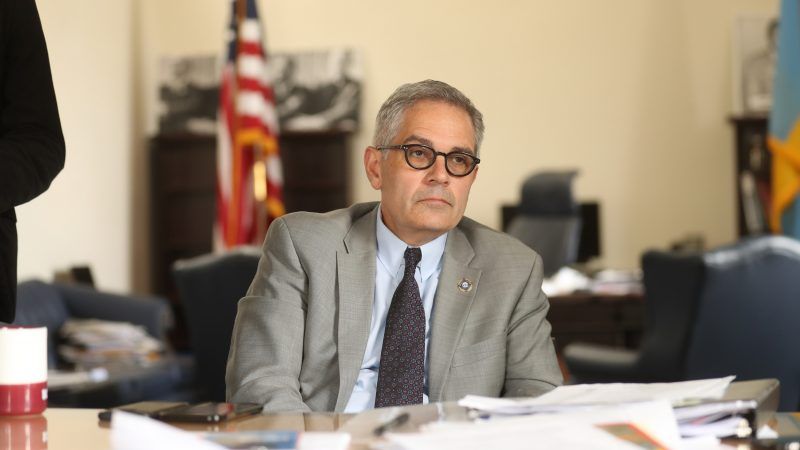Philadelphia D.A. Larry Krasner Argues PA Death Penalty Is Unconstitutional
"Because the death penalty has repeatedly been handed out in an unreliable and arbitrary manner, it cannot survive the state Constitution’s ban on cruel punishments."

A petition before the Pennsylvania Supreme Court by two death row inmates could upend Pennsylvania's dysfunctional death penalty, and it has one extremely unusual supporter: the Philadelphia District Attorney's Office.
In a legal brief filed Monday night in support of the petition, Philadelphia D.A. Larry Krasner, who ran for office promising to never pursue a death sentence, argues Pennsylvania's death penalty is applied unreliably and arbitrarily, violating the state constitution's ban on cruel punishment.
To reach its conclusions, the Philadelphia District Attorney's Office reviewed every case where a Philadelphia defendant received a death sentence between 1978 and 2017. The study found that 72 percent of those 155 sentences were ultimately overturned—more than half of them for ineffective legal assistance.
"Where nearly three out of every four death sentences have been overturned—after years of litigation at significant taxpayer expense—there can be no confidence that capital punishment has been carefully reserved for the most culpable defendants, as our Constitution requires," the office wrote in its brief. "Where a majority of death sentenced defendants have been represented by poorly compensated, poorly supported court-appointed attorneys, there is a significant likelihood that capital punishment has not been reserved for the 'worst of the worst.'"
The brief was filed in the case of Jermont Cox and Kevin Marinelli, who were sentenced to death for three drug-related murders in 1992 and a fatal 1994 shooting, respectively. Their petition argues that the Pennsylvania Supreme Court should strike down the state's capital punishment system because of its "pervasive unreliability" and "systemic dysfunction," citing the scores of reversed death penalty sentences, as well as six death row exonerations.
Cox and Marinelli's petition has attracted amici briefs from groups like the Pennsylvania chapter of the American Civil Liberties Union (ACLU) and the NAACP Legal Defense Fund.
Meanwhile, the Pennsylvania attorney general, the Philadelphia chapter of the Fraternal Order of Police, and several groups of Republican state lawmakers filed briefs opposing the petition. But it appears to be the first time, at least as far as several criminal justice experts can tell, that a district attorney has argued broadly in court against a state death penalty.
"There have been individual cases where a particular defendant challenges the death penalty and a prosecutor who reviews the case on appeal decides, you know, we can't defend what happened here," says David Rudovsky, a professor at the University of Pennsylvania Law School. "I don't know of any case of a broad-scale attack like this on the whole system, where a prosecutor agreed that the death penalty, at least in application here in Pennsylvania, is unconstitutional."
Last year, the prosecuting attorney for King County, Washington, wrote an op-ed calling on the state to end the death penalty.
Krasner, a former civil rights attorney, was elected in 2017 and is one of the most high-profile members of a wave of progressive candidates who have run for prosecutor offices in major cities in recent years, promising to roll back policies they say contribute to mass incarceration.
Krasner pledged during his campaign to never seek the death penalty. That decision, along with others, has led to intense opposition from police unions and critical local news coverage.
Although Pennsylvania is one of 30 states where the death penalty is still on the books, there have only been three executions in the state since 1978. The last took place in 1999. Four years ago, Pennsylvania Democratic Gov. Tom Wolf announced a moratorium on the death penalty that still remains in place.
Nationwide, the use of capital punishment has steadily declined and become more geographically isolated over the past few decades. Only a handful of counties in the U.S. are responsible for the majority of new death penalty sentences. Last year, the Washington Supreme Court struck down the state's death penalty "because it is imposed in an arbitrary and racially biased manner"—much the same argument that Cox and Marinelli, as well as Krasner, make.
However, the extraordinary cost of death penalty trials and near non-existence of executions have not stopped Pennsylvania prosecutors from pursuing capital punishment. A 2016 analysis by the Reading Eagle found that the state had spent $816 million on the death penalty since 1978.


Show Comments (31)